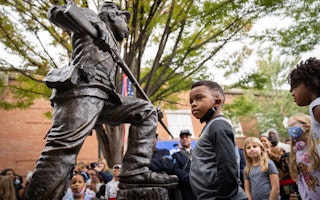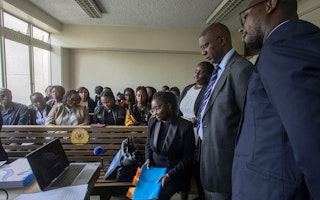The Manufactured Moral Panic Over Critical Race Theory
By Kimberlé Crenshaw

Faculty being barred from testifying in lawsuits in Florida. Teachers being made to take loyalty oaths in New Hampshire. Monitors being placed in classrooms, and bounties being placed on teachers for exposing students to divisive subjects like the history of genocide and segregation. These are just some of the recent attacks on knowledge and on our very democracy unfolding in America today—attacks which have reached unimaginable heights. These are the consequences of the unfinished work of grappling with our nation’s racial history and our profound discomfort in talking about it. When we’re faced with the banning of more than one thousand books nationwide, including those by Nobel Prize winner Toni Morrison and civil rights pioneer Ruby Bridges, we can see that it is because of the unfinished business with our discomforting legacies.
The Confederate flag that entered the U.S. Capitol for the first time in history on January 6 was no accident; the men and women who sought to retake a nation they believed to be stolen from them were far from colorblind in their grievance about what they were losing and to whom. And yet, despite the clear and present danger that finds our democracy teetering on the edge of implosion, we have witnessed an unease in grappling with the White supremacist conditions of this possibility, a condition that disables the nation’s ability to sound the alarms that are now overdue. In the face of insurrection, political violence, and a nearly successful political coup, we hear refrains that “this is not who we are,” despite the fact that violent coups, vicious repression, and utter tyranny are clearly part of who we have been.
These are the questions that critical race thinking takes up. And it is perhaps why the manufactured moral panic over Critical Race Theory has been used to justify some of the most dramatic assaults on ideas, education, and democratic participation since the McCarthy era.
Racial grievance is the Trojan Horse that has brought authoritarianism to the center of American politics; liberal discomfort is its enabler. Want to ban books, discredit and defund public education, undermine democratic participation, and gain a greater toehold in the terrain of higher education? Create a racial boogeyman, load it up with the kind of frights that send your disgruntled base screaming into local school boards, and then count on the mainstream press to launder your disinformation by applying its “both sides” reporting to this newly minted “controversy.” Meanwhile, others simply wait to see whether the mob will come for them. Of course, they will, and they have. But as Pastor Martin Niemöller famously wrote, by the time they do, there will be no one left to speak out for them.
The damage that antidemocratic forces have been able to inflict is not because they are particularly stealthy. They have been clear about their objectives to return to a mythic past, to dismantle public institutions that stand in the way, to change the rules so that they can win, and to generate alternative facts when the real ones don’t work for them. Majorities in this country oppose all of these moves. But our collective avoidance of uncomfortable conversations about race—and the negligence in teaching our children about it—allows this agenda to fly under the radar. When fewer than 10 percent of high school seniors can correctly identify that slavery was the cause of the Civil War, the clear and present threat isn’t too much education about our history, but too little.
Well, what exactly is Critical Race Theory? CRT is knowledge from and about lives lived in the twilight of an aborted racial reckoning, in a nation that has yet to meet Dr. King’s demand to fund the promissory note. CRT is the reason some of us place our hands at the 10 o’clock and 2 o’clock positions when we see the flashing lights in our rearview mirror. It is the talk many of us must give our children to improve their odds of survival. It is the mirror we hold up to our whole society. It is the recognition that if people are unaware of the policies, politics, and practices that created segregated housing markets, the criminal injustice system, gaping wealth, health disparities, and more, they will default to understanding these conditions as natural, neutral, just there, leaving efforts to redress them to appear to be preferential.
We do not seek to be forever bound to the practice, myths, and beliefs of the past. But we can and should do more to protect the legacy of the last 70 years by defending academic freedom in our faculty senates, real reporting in our editorial desks, real accountability in our boardrooms, real history in our classrooms, and sustained actions to diversify our institutions. If we blink in the face of what we are confronting, give in to the ambivalence grounded in discomfort, we will leave it for another generation to solve our unfinished business, with fewer tools to do so.
When my students ask me where in the midst of this unfolding crisis I find room to hope, I remind them that the founding mothers and fathers of the nation had no concrete reason to be hopeful for a better America. But Frederick Douglass, Charles Hamilton Houston, Fannie Lou Hamer, Pauli Murray, and others knew that the very possibility of a future that reflects our highest aspirations turns on sustaining our belief that such a future is right and worth fighting for. The pursuit of knowledge, like freedom and democracy, is a constant struggle. It is not a one-and-done scenario; we don’t get to keep what was won in one generation without struggling to name it, retain it, institutionalize it, and protect it. I for one do not want to be that generation that failed to pass the baton to the next in a better position than the one I received it in.
This Voices post was adapted from a speech given by the author to the American Academy of Arts and Sciences.
African American Policy Forum is a grantee of the Open Society Foundations.
Kimberlé Crenshaw is a law professor at Columbia University and the University of California, Los Angeles, and executive director of the African American Policy Forum.


